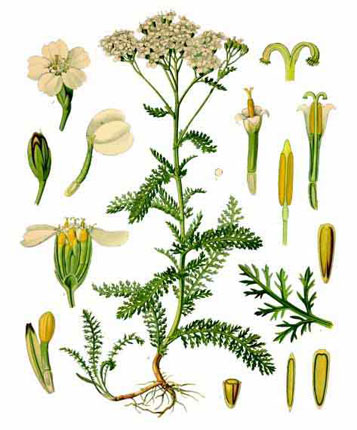Yarrow – Achillea millefolium L.
Perennial herb up to 60-80 cm, families slozhnotsvetnыh (Combined). Distributed almost throughout Russia, except for the northern regions of Siberia and the Far East, desert and semi-arid regions of Central Asia, Kazakhstan and the Lower Volga. For medical purposes harvested yarrow.

Yarrow – chemical composition
The leaves of the plant contain the alkaloid ahillein, essential oil, which includes chamazulene; esters, kamforu, thujone, ʙorneol, Cineol, glycosides - apigenin and luteolin, tannins, resin, amino acids, organic acid, carotene, Vitamin K, ascorbic acid, bitter substances.
Yarrow – Pharmacological properties
Grass Yarrow has multilateral pharmacological properties, due to the presence in medicinal raw material of various biologically active compounds. Galenic yarrow herb has antispasmodic effect on the smooth muscle of the intestine, urinary and biliary tract, and therefore enhance the bile ducts and increase bile into the duodenum, and increase urine output and can stop pain caused by spasms in the gut. These properties are associated with preparations containing plants in flavonoids and essential oils. In connection with a bitter taste ahillein yarrow closure irritating taste nerves and increases the secretion of gastric juice. Grass Yarrow, Besides, reduces flatulence.
The content of tannins in the plant, essential oil and chamazulene due to anti-inflammatory, baktericidnыe, anti-allergic and wound healing properties of yarrow.
In an experiment on dogs when administered 10 % through the infusion of yarrow 30 min is observed slowing of heart rate. Besides, contained in the plant flavonoids possess hypotensive properties.
Infusion of yarrow increases blood clotting, which is manifested in shortening the time of plasma recalcification oxalate, increase tolerance plasma heparin, reducing time heparin. On the fibrinolytic activity of the blood infusion Yarrow acts poorly defined, which may be associated with sharp fluctuations in blood fibrinolytic activity in experimental animals. The concentration of Ac-globulin (Factor V) and fibrin under the influence of yarrow tincture almost unchanged.
Hemostatic mechanism of action of drugs of yarrow is somewhat reminiscent of the participation of calcium ions in the blood clotting process. Preparations yarrow activating effect of fibrin, but will never lead to the formation of blood clots. Influence of herbal milfoil forms on the process of blood coagulation is expressed moderately and is seen only with prolonged use. At the heart of hemostatic effect of yarrow is an increase in the number of platelets, and shortening the time to stop bleeding.
The combination of hemostatic properties and the ability to enhance uterine contractions determines the effectiveness of Yarrow uterine bleeding.
Yarrow – medical applications.
Herbal medicines from Yarrow is widely used in diseases of the gastrointestinal- intestinal tract both in native form, and in combination with other plants in the form of fees, teas or tinctures complex. They are used for gastritis with reduced secretion of gastric juice, gastric ulcer and duodenal ulcer, ulcerative colitis, spastic, flatulence and hemorrhoids.
The systematic use of herbal medicines plants in patients with normal secretion and motility of the digestive tract, improving bile secretion and secretory activity of the pancreas, increased appetite, pain disappear.
Hemostatic properties of the plant are used in the gastro-intestinal, hemorrhoidal bleedings. In clinical studies infusion of yarrow herb noted the high therapeutic efficacy of its patients, especially in combination with other herbs, has anti-inflammatory and antispasmodic properties (camomile, Calendula officinalis, waybread, peppermint and others.). Good results give an enema with the infusion of yarrow with hemorrhoids. Yarrow is used as a hemostatic agent in the nasal, tubal, pulmonary hemorrhage. Particularly effective liquid extract and tincture grass plants uterine bleeding on the basis of inflammatory processes, fiʙromiom, during heavy menstruation.
Outdoor use of infusions or liquid extract of yarrow is based mainly on anti-inflammatory properties of plants. Bandages, plant extract-soaked, applied to the wound, cuts, ulcers. Infusion of yarrow washed wounds.
Yarrow – Dosage Forms, Dosing and Administration
Infusion of herbs yarrow: 15 g (2 tablespoons) raw material is placed in an enamel bowl, Pour 200 ml (1 glass) hot boiled water, capped and heated in boiling water (in a water bath) 15 m. Cooled at room temperature for 45 m, filter, the remaining raw materials squeeze. The volume of the resulting infusion was adjusted with boiled water to 200 ml. The prepared infusion stored in a cool place no more than 2 d.
The interior in the form of heat for 1 / 2-1 / 3 cup 2 3 times a day 30 minutes before a meal as a hemostatic agent in lung, intestinal, hemorrhoidal, tubal, nosebleeds, bleeding from the gums and wounds, gastritis, peptic ulcer.
Grass stored in dry, cool place.
Liquid extract of yarrow Take 40-50 drops 3 once a day.
Grass Yarrow part of the stomach of delicious teas and potions.
